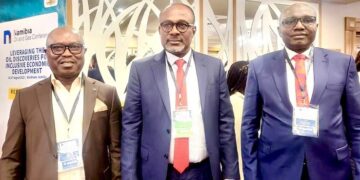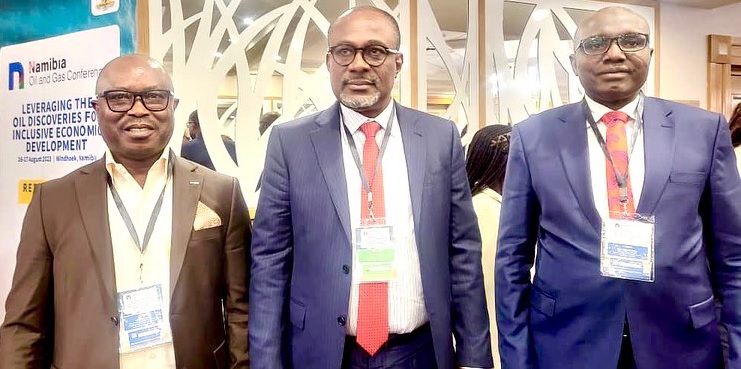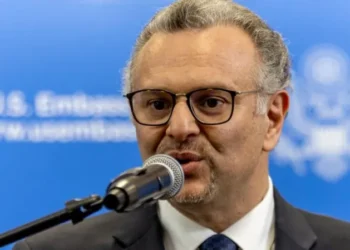By John Ikani
Amidst the backdrop of significant oil and gas findings in various African countries, the Nigerian Content Development and Monitoring Board (NCDMB) has put forth a comprehensive set of strategies aimed at guiding nations in Africa to establish enduring Local Content practices.
The strategies seek to foster domestic value addition and fully harness the potential benefits derived from exploiting their hydrocarbon reserves.
Sharing the strategies at the recent Namibia Oil and Gas Conference held in Windhoek, the Executive Secretary of the NCDMB, Engr. Simbi Kesiye Wabote highlighted an interesting fact: while Africa contributes approximately 12% to the global annual oil production, it consumes merely less than 4% of this output.
According to him, the situation points toward untapped possibilities in refining, processing, and utilizing oil and gas within the continent, with the potential to uplift the overall quality of life.
Engr. Wabote, an eminent advocate for local content practices in Africa, offered a comprehensive framework comprising key factors that hold the key to achieving value addition and sustainable growth in the sector.
The factors encompass Regulatory Framework, Gap Analysis, Capacity Building, Funding and Incentives, Research and Development, and Access to Market.
Drawing attention to the Nigerian Oil and Gas Industry Content Development (NOGICD) Act of 2010, Engr. Wabote said “It is important to an enabling regulatory structure supported by pertinent legislation for effective local content implementation.”
He stressed that “a firm legal framework is more effective than policies open to speculation or compliance on a discretionary basis. Once such a statute is enacted, compliance with local content standards becomes a non-negotiable commitment.”
Discussing the regulatory aspect, Engr. Wabote noted that “the law should be designed to encourage investments rather than impede them, both domestically and internationally.”
He also advocated for “incorporating provisions within the law to address gaps without necessitating complete overhauls, exemplifying the flexibility demonstrated by the NOGICD Act through Ministerial Regulations.”
Furthermore, Engr. Wabote underscored the importance of pragmatic enforcement of regulations, acknowledging the dynamic nature of the oil and gas industry where aspirations and realities often diverge.
Addressing Gap Analysis, Engr. Wabote proffered “conducting baseline and periodic assessments to identify critical areas requiring attention, such as skills, infrastructure, and facilities.”
The local content chieftain acknowledged the challenge of addressing all gaps overnight and proposed a pragmatic approach that “prioritizes high-impact areas and employs prudent implementation measures.”
He stressed that sustained capacity building, coupled with the execution of major projects, is pivotal to nurturing domestic capabilities.
Highlighting the importance of a consistent flow of substantial projects, the NCDMB boss noted that “the strategy fosters ongoing utilization of established capacities and attracts additional investments.”
Regarding Funding and Incentives, Engr. Wabote stressed their vital role in executing local content initiatives, infrastructure development, and the attraction of fresh investments.
He highlighted the Nigerian Content Development Fund (NCDF) as an illustrative example, utilized to establish the $350 million Nigerian Content Intervention Fund, advance the Nigerian Oil and Gas Parks Scheme (NOGAPS), and construct the 17-storey headquarters of the Board.
On the subject of Research and Development, Engr. Wabote emphasized the role of robust guidelines in nurturing homegrown technology.
He pointed to the $50 million Nigerian Content Research and Development Fund in Nigeria, dedicated to fostering basic research, commercializing breakthroughs, establishing Centers of Excellence, and supporting university endowments.
Dwelling on the significance of Access to Market, Wabote noted that “even with well-crafted policies, developed capacities, and diligent research, the absence of outlets for utilization and reward can lead to frustration.”
He also noted the potential benefits stemming from the African Continental Free Trade Agreement (AfCFTA).
Engr. Wabote concluded his presentation with a plea to Namibia, urging the nation to avert the “Dutch Disease” syndrome, where rapid growth in the oil and gas sector detrimentally affects other sectors of the economy.
He stressed that the excitement surrounding oil and gas discoveries and development should not eclipse other vital sectors such as mining, fishing, agriculture, and tourism.
The enlightening discourse took place within the framework of the Namibia Oil and Gas Conference, co-organized by the Economic Association of Namibia (EAN), Namibia Investment Promotion and Development Board (NIPDB), and the Hanns Seidel Foundation (HSF), in partnership with the National Petroleum Corporation of Namibia (NAMCOR).
The event concluded on Thursday, leaving attendees with a wealth of insights to contemplate.



































